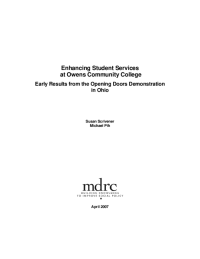Enhancing Student Services at Owens Community College
Early Results from the Opening Doors Demonstration in Ohio
Community colleges offer an important pathway to better jobs and higher earnings, especially for individuals who might otherwise lack the financial or academic preparation to pursue higher education. Research suggests, however, that many community college students want to earn a degree, but are hindered by the competing demands of work and family and by institutional barriers, such as inadequate student support services and insufficient financial aid. MDRC and a consortium of funders launched the Opening Doors demonstration in 2003 to study the effects of community college programs designed to help students persist in school and earn a credential.
This report presents early results from the Opening Doors program at Owens Community College in Toledo, Ohio, which operated from 2004 through 2006. The program served students whose family income was below 250 percent of the federal poverty level and who were either incoming freshmen or returning students who had completed fewer than 13 credits and had a history of academic difficulties. The two-semester program provided enhanced student services and a $150 scholarship each semester (for a total of $300), which was paid after required advising sessions. Students were assigned to an academic adviser, with whom they were expected to meet frequently to discuss their academic progress and issues that might affect their schooling. Each adviser worked with no more than 185 students. Program participants also sometimes met with a designated contact in the financial aid office and received free one-on-one tutoring in the college’s Learning Center. In contrast, other students at Owens had access to academic advisers, as needed, at a walk-in center, which employed one staff member for roughly every 1,000 students. Students could visit the college’s Learning Center, where they typically received tutoring assistance in a group. If they needed more individualized help, they could receive one-on-one tutoring for a nominal fee.
MDRC is evaluating Owens’ program using a random assignment research design. Students were assigned in a lottery-like process either to a program group that received Opening Doors services or to a control group that received the college’s regular services. Analysis of transcript data shows:
- Owens’ Opening Doors program increased registration rates while students received services. Students in the program group were more likely than students in the control group to reenroll in college after one semester, and they registered for more credits. However, they were more likely to withdraw from at least one course, so they did not earn any more credits than students in the control group.
- The increase in enrollment ended when the program’s services ended. In the semester after the program ended, enrollment and course registration rates for the two research groups were similar.
- The positive effects on enrollment during the program gave Opening Doors students a slight advantage overall. Results summarizing outcomes for students’ first three semesters in the study show a very small increase in the number of semesters enrolled for the program group (they enrolled, on average, for an additional one-tenth of a semester).
The early results from Owens show that the program boosted enrollment in the short run but did not have a significant lasting effect. Future reports will track academic outcomes over a longer follow-up period to determine whether the early effects on enrollment reemerge, and will present results on a wider array of measures, including degree completion, transfer, employment, and well-being.






